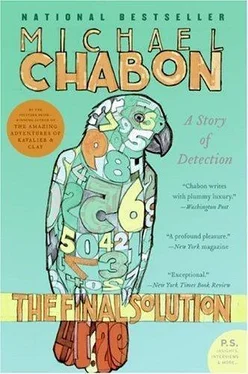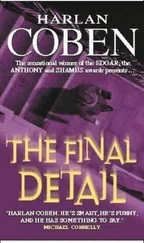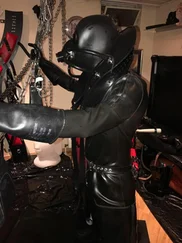Michael Chabon
The Final Solution: A Story of Detection
To the memory of
Amanda Davis
First reader or these pages
The distinction's always fine
between detection and invention.
— MARY JO SALTER
1
A boy with a parrot on his shoulder was walking along the railway tracks. His gait was dreamy and he swung a daisy as he went. With each step the boy dragged his toes in the rail bed, as if measuring out his journey with careful ruled marks of his shoetops in the gravel. It was midsummer, and there was something about the black hair and pale face of the boy against the green unfurling flag of the downs beyond, the rolling white eye of the daisy, the knobby knees in their short pants, the self-important air of the handsome gray parrot with its savage red tail feather, that charmed the old man as he watched them go by. Charmed him, or aroused his sense-a faculty at one time renowned throughout Europe-of promising anomaly.
The old man lowered the latest number of The British Bee Journal to the rug of Shetland wool that was spread across his own knobby but far from charming knees, and brought the long bones of his face closer to the window-pane. The tracks-a spur of the Brighton-Eastbourne line, electrified in the late twenties with the consolidation of the Southern Railway routes-ran along an embankment a hundred yards to the north of the cottage, between the concrete posts of a wire fence. It was ancient glass the old man peered through, rich with ripples and bubbles that twisted and toyed with the world outside. Yet even through this distorting pane it seemed to the old man that he had never before glimpsed two beings more intimate in their parsimonious sharing of a sunny summer afternoon than these.
He was struck, as well, by their apparent silence. It seemed probable to him that in any given grouping of an African gray parrot-a notoriously prolix species-and a boy of nine or ten, at any given moment, one or the other of them ought to be talking. Here was another anomaly. As for what it promised, this the old man-though he had once made his fortune and his reputation through a long and brilliant series of extrapolations from unlikely groupings of facts-could not, could never, have begun to foretell.
As he came nearly in line with the old man's window, some one hundred yards away, the boy stopped. He turned his narrow back to the old man as if he could feel the latter's gaze upon him. The parrot glanced first to the east, then to the west, with a strangely furtive air. The boy was up to something. A hunching of the shoulders, an anticipatory flexing of the knees. It was some mysterious business-distant in time but deeply familiar-yes-
— the toothless clockwork engaged; the unstrung Stein-way sounded: the conductor rail.
Even on a sultry afternoon like this one, when cold and damp did not trouble the hinges of his skeleton, it could be a lengthy undertaking, done properly, to rise from his chair, negotiate the shifting piles of ancient-bachelor clutter- newspapers both cheap and of quality, trousers, bottles of salve and liver pills, learned annals and quarterlies, plates of crumbs-that made treacherous the crossing of his parlor, and open his front door to the world. Indeed the daunting prospect of the journey from armchair to doorstep was among the reasons for his lack of commerce with the world, on the rare occasions when the world, gingerly taking hold of the brass door-knocker wrought in the hostile form of a giant Apis dorsata, came calling. Nine visitors out of ten he would sit, listening to the bemused mutterings and fum-blings at the door, reminding himself that there were few now living for whom he would willingly risk catching the toe of his slipper in the hearth rug and spilling the scant remainder of his life across the cold stone floor. But as the boy with the parrot on his shoulder prepared to link his) own modest puddle of electrons to the torrent of them being pumped along the conductor, or third, rail from the Southern Railway power plant on the Ouse outside of Lewes, the old man hoisted himself from his chair with such unaccustomed alacrity that the bones of his left hip produced a disturbing scrape. Lap rug and journal slid to the floor.
He wavered a moment, groping already for the door latch, though he still had to cross the entire room to reach it. His failing arterial system labored to supply his suddenly skybound brain with useful blood. His ears rang and his knees ached and his feet were plagued with stinging. He lurched, with a haste that struck him as positively giddy, toward the door, and jerked it open, somehow injuring, as he did so, the nail of his right forefinger.
"You, boy!" he called, and even to his own ears his voice sounded querulous, wheezy, even a touch demented. "Stop that at once!"
The boy turned. With one hand he clutched at the fly of his trousers. With the other he cast aside the daisy. The parrot sidestepped across the boy's shoulders to the back of his head, as if taking shelter there.
"Why, do you imagine, is there a fence?" the old man said, aware that the barrier fences had not been maintained since the war began and were in poor condition for ten miles in either direction. "For pity's sake, you'd be fried like a smelt!" As he hobbled across his dooryard toward the boy on the tracks, he took no note of the savage pounding of his heart. Or rather he noted it with anxiety and then covered the anxiety with a hard remark. "One can only imagine the stench."
Flower discarded, valuables restored with a zip to their lodging, the boy stood motionless. He held out to the old man a face as wan and empty as the bottom of a beggar's tin cup. The old man could hear the flatted chiming of milk cans at Satterlee's farm a quarter mile off, the agitated rustle of the housemartins under his own eaves, and, as always, the ceaseless machination of the hives. The boy shifted from one foot to the other, as if searching for an appropriate response. He opened his mouth, and closed it again. It was the parrot who finally spoke.
"Zwei eins sieben fünf vier sieben drei," the parrot said, in a soft, oddly breathy voice, with the slightest hint of a lisp. The boy stood, as if listening to the parrot's statement, though his expression did not deepen or complicate. " Vier acht vier neun eins eins sieben."
The old man blinked. The German numbers were so unexpected, literally so outlandish, that for a moment they registered only as a series of uncanny noises, savage avian utterances devoid of any sense.
"Bist du deutscher?" the old man finally managed, a little uncertain, for a moment, of whether he was addressing the boy or the parrot. It had been thirty years since he had last spoken German, and he felt the words tumble from a high back shelf of his mind.
Cautiously, with a first flicker of emotion in his gaze, the boy nodded.
The old man stuck his injured finger into his mouth and sucked it without quite realizing that he did so, without remarking the salt flavor of his own blood. To encounter a solitary German, on the South Downs, in July 1944, and a German boy at that-here was a puzzle to kindle old appetites and energies. He felt pleased with himself for having roused his bent frame from the insidious grip of his armchair.
"How did you get here?" the old man said. "Where are you going? Where in heaven's name did you get that parrot?" Then he offered translations into German, of varying quality, for each of his questions.
The boy stood, faintly smiling as he scratched at the back of the parrot's head with two grimy fingers. The density of his silence suggested something more than unwillingness to speak; the old man wondered if the boy might be rather less German than mentally defective, incapable of sound or sense. An idea came to the old man. He held up a hand to the boy, signaling that he ought to wait just where he was. Then he withdrew once more to the gloom of his cottage. In a corner cabinet, behind a battered coal scuttle in which he had once kept his pipes, he found a dust-furred tin of violet pastilles, stamped with the portrait of a British general whose great victory had long since lost any relevance to the present situation of the Empire. The old man's retinae swam with blots and paisley tadpoles of remembered summer light, and the luminous inverted ghost of a boy with a parrot on his shoulder. He had a sudden understanding of himself, from the boy's point of view, as a kind of irascible ogre, appearing from the darkness of his thatched cottage like something out of the Brothers Grimm, with a rusted tin of suspect sweets in his clawlike, bony hand. He was surprised, and relieved as well, to find the boy still standing there when he re-emerged.
Читать дальше
Конец ознакомительного отрывка
Купить книгу












